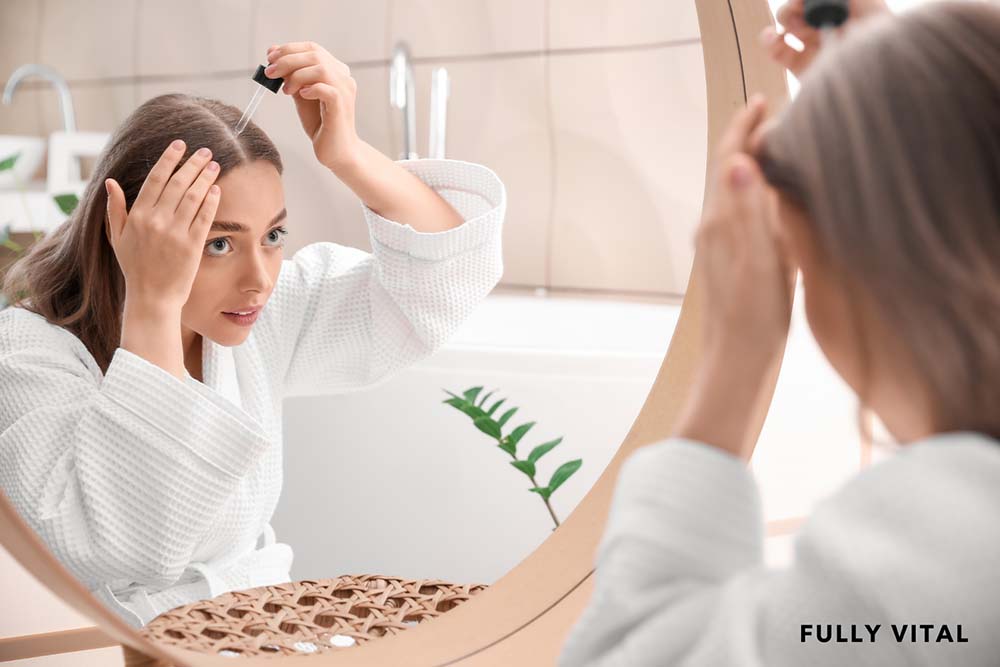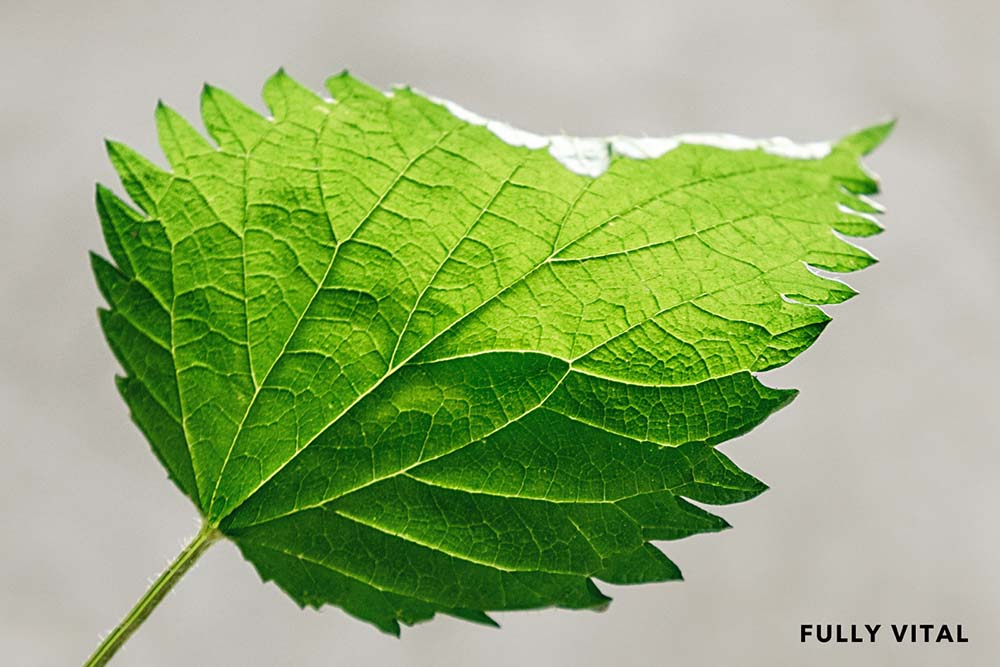
Humectant: Unlocking the Secret to Healthy Hair Growth
Are you tired of dealing with dry, brittle hair that seems to never grow?
Look no further! In this article, we'll delve into the world of humectants and discover how these magical ingredients can stimulate hair growth and give you the luscious locks you've always dreamed of.
Whether you have curly, straight, or wavy hair, understanding the power of humectants is the key to achieving the hair of your dreams.

I LOVE MY HAIR NOW
FullyVital hair serum and hair vitamins made tremendous improvements in my hair. I truly love my hair now.
Meg S.,
What is Humectant?
Humectant is a term that's been buzzing around the hair care industry lately.
But what exactly is it? In simple terms, a humectant is a substance that helps to retain moisture.
When used in hair care products, humectants work by attracting and holding onto water molecules, which helps to hydrate your hair strands from within.
This moisture retention is essential for promoting healthy hair growth.(1)

Why is Humectant Important?
Humectants play a crucial role in maintaining the overall health of your hair. Here's why they are so important:
Hydration
Humectants provide deep hydration to your hair, preventing it from becoming dry and brittle.
Well-hydrated hair is more elastic, stronger, and less prone to breakage.(2)
Moisture Retention
By attracting and retaining moisture in your hair, humectants create a protective barrier that prevents dehydration.
This helps to maintain optimal moisture levels, even in dry or humid environments.
Enhanced Elasticity
Humectants improve the elasticity of your hair, making it more flexible and less prone to damage.
This allows your hair to stretch and withstand tension without breaking.
Manageability
Humectants reduce frizz and flyaways, making your hair more manageable.
This is especially beneficial for those with curly or coarse hair textures.
How Does Humectant Work?
Humectants work by leveraging their unique properties to draw moisture from the air and bind it to your hair strands.
Here's a breakdown of the process:
Attracting Moisture
Humectants have hygroscopic properties, meaning they can attract and absorb water molecules from the surrounding environment.
Binding to Hair
Once the moisture is attracted, humectants bind to the hair shaft, forming a protective film that seals in the moisture and prevents it from escaping.
Continuous Hydration
Humectants continuously draw moisture from the air, replenishing the hair's moisture content and ensuring it remains hydrated over time.
What are the Benefits of Humectant?
Humectants offer a wide range of benefits that contribute to healthy hair growth. Here are some key advantages:
Intense Hydration
Humectants provide deep hydration to your hair, preventing dryness and improving its overall health.(3)
Stimulated Hair Growth
Well-moisturized hair is more likely to grow at its full potential, as it's less prone to breakage and damage.
Improved Elasticity
Humectants enhance the elasticity of your hair, allowing it to stretch and bounce back without snapping.
Frizz Control
By retaining moisture, humectants reduce frizz and keep your hair smooth and sleek.
Manageable Styling
With the help of humectants, your hair becomes more manageable, making it easier to style and control.
The History of Humectant
Humectants have been utilized in hair care for a significant period of time.
Understanding the history of humectants provides insight into their importance in the industry:
Ancient Roots
The use of humectants in hair care can be traced back to ancient civilizations.
Natural substances like honey and aloe vera were recognized for their humectant properties and employed to moisturize and nourish hair.
Scientific Advancements
With advancements in scientific research, humectants have been studied and incorporated into modern hair care formulations.
This has led to a better understanding of their mechanisms and enhanced product development.
Hair Care Innovations
Over time, humectants have become a key component in various hair growth products, addressing the need for effective moisture retention and promoting healthy hair.
The Current Environment of Humectant
In the present hair care landscape, humectants play a vital role. Here are some aspects highlighting the current environment of humectants:
Consumer Demand
As awareness about the importance of moisture in hair health increases, there is a growing demand for humectant-based products among consumers.
People are seeking effective solutions to combat dryness, enhance hair elasticity, and promote overall hair growth.
Formulation Innovations
Hair growth product companies are continuously developing innovative formulations that incorporate humectants to meet the needs of diverse hair types.
These formulations focus on providing optimal moisture balance, frizz control, and improved hair manageability.
Ingredient Combinations
Humectants are often combined with other beneficial ingredients, such as oils, vitamins, and plant extracts, to create comprehensive hair care products.
These combinations offer a synergistic effect, providing multiple benefits to the hair.
The Future of Humectant
Looking ahead, humectants are poised to continue shaping the hair care industry. Here's a glimpse into the future of humectants:
Technological Advancements
Ongoing research and advancements in hair care technology will likely lead to the development of even more effective humectant-based products.
These products will be tailored to specific hair concerns and offer advanced moisture retention and hair growth benefits.
Sustainable Solutions
The future of humectants also entails a focus on sustainability.
Hair growth product companies are likely to explore eco-friendly and naturally derived humectants, reducing the environmental impact of their formulations.
Personalized Hair Care
With the rise of personalized beauty, humectants will play a role in customized hair care routines.
Hair analysis and data-driven insights will enable individuals to select humectants that cater to their unique hair needs, leading to optimized results.
What is a Humectant Used For?
Humectants serve various purposes when it comes to hair care. Here are some key uses:
Moisture Retention
Humectants are primarily used to attract and retain moisture in the hair.
They help to hydrate the hair strands, preventing dryness and brittleness.
Enhancing Hair Elasticity
By providing moisture, humectants improve the elasticity of the hair, making it more flexible and resistant to breakage.
Frizz Control
Humectants help to reduce frizz and flyaways by maintaining optimal moisture levels in the hair, resulting in smoother, more manageable locks.
Stimulating Hair Growth
Well-hydrated hair is less prone to damage and breakage, which promotes healthier hair growth over time.
What is the Most Common Humectant?
One of the most commonly used humectants in hair care products is glycerin.
Glycerin is widely recognized for its excellent moisturizing properties and ability to attract and retain moisture in the hair.
It's often found in leave-in conditioners, moisturizers, and styling products.
Are There Any Downsides to Humectant?
While humectants offer numerous benefits, it's important to be aware of potential downsides.
Here are a few things to consider:
Humidity Sensitivity
Humectants are highly effective in humid environments, but in extremely dry conditions, they may draw moisture from the hair, causing it to become drier.
Product Buildup
Some humectant-rich products can lead to product buildup on the hair and scalp if not properly rinsed out.
Regular clarifying shampoos can help prevent this issue.
Individual Sensitivity
Just like with any hair care ingredient, some individuals may be more sensitive to humectants.
It's advisable to perform a patch test before using products containing humectants extensively.
What are Humectant Examples?
When it comes to humectants, there are several examples that you may come across in hair care products. These include:
Glycerin
Glycerin is a popular humectant known for its moisturizing properties.
It attracts water from the environment and helps to retain moisture in the hair.
Hyaluronic Acid
This humectant is widely used in skincare but is also beneficial for hair.
It can hold up to 1000 times its weight in water, providing intense hydration to the hair strands.
Propylene Glycol
Propylene glycol is a common humectant found in many hair care products.
It helps to maintain moisture balance and prevents dryness.
Sorbitol
Sorbitol is a natural humectant derived from fruits.
It helps to keep the hair hydrated and prevents moisture loss.
When Should I Apply Humectants to My Hair?
To get the most out of humectants, it's important to know when and how to apply them.
Here are some guidelines:
Post-Shampoo, Pre-Conditioner
Apply humectant-based products, such as leave-in conditioners or moisturizing sprays, after shampooing your hair and before applying your regular conditioner.
This allows the humectants to penetrate the hair strands and lock in moisture.
On Damp Hair
Humectants work best on damp or wet hair.
After washing your hair, gently towel-dry or squeeze out excess water, leaving your hair slightly damp.
Then, apply the humectant product evenly from roots to ends.
As Needed
The frequency of application depends on your hair's moisture needs and the climate you're in.
If your hair tends to be dry or you live in a dry environment, you may want to apply humectants more frequently.
Avoid Scalp Application
When using humectant-based products, focus on applying them to the lengths and ends of your hair, avoiding direct application to the scalp.
This prevents any potential scalp irritation.
Can Humectants Dry Out Hair?
While humectants are known for their ability to attract moisture, in certain circumstances, they can contribute to hair dryness.
Here's why:
Low Humidity Environments
In dry climates or during winter months when the air is lacking moisture, humectants may draw moisture from the hair into the environment, leading to dryness.
Excessive Use
Using humectant-rich products excessively or in high concentrations can potentially overload the hair with moisture and cause it to become dry or brittle.
What are the Alternatives to Humectant?
If you're looking for alternatives to humectants or want to mix up your hair care routine, consider the following options:
Oils
Natural oils like argan oil, coconut oil, and jojoba oil can help moisturize and nourish your hair without relying on humectants.
Silicones
Certain silicone-based products can create a barrier on your hair, sealing in moisture and providing a protective layer against external aggressors.
Glycerin-Free Products
If you're sensitive to humectants or live in a very dry climate, opting for glycerin-free products may help prevent excessive moisture loss.
Unlock the Secrets to Youthful Hair with Fully VitalExperience the transformational power of our science-backed hair growth products at Fully Vital. Say goodbye to the signs of aging hair and embrace a healthier, more vibrant relationship with your locks.
Experience the Fully Vital difference and embark on a journey towards rejuvenated, more youthful-looking hair. Unleash the potential of your locks with our hair growth products and take control of your hair's aging process. Remember, healthy, vibrant hair is within your reach. Elevate your hair care routine with Fully Vital and embrace a new chapter of hair vitality. |
Final Thoughts On Humectant
Humectants are an essential topic in the realm of hair care, particularly when it comes to stimulating hair growth and maintaining healthy locks.
Understanding what humectants are, how they work, and their benefits allows us to make informed decisions about our hair care routine.
Humectants, such as glycerin, hyaluronic acid, and propylene glycol, act as moisture magnets, attracting and retaining hydration in the hair.
They enhance elasticity, control frizz, and contribute to overall hair health.
While using humectants, it's important to consider factors like climate, frequency of usage, and product combinations to achieve optimal results.
As we delve into the history, current environment, and future of humectants, we recognize their significance in the hair care industry.
Hair growth product companies, like ours at Fully Vital, continue to innovate and develop formulations that harness the power of humectants to promote healthy hair growth and combat the aging of hair.
If you're seeking to maintain a healthy relationship with your locks and stimulate hair growth, consider exploring our range of hair growth products at Fully Vital.
Our products are specifically designed to address your hair's needs and provide the nourishment and care it deserves.
Remember, incorporating humectant-based products into your hair care routine can make a noticeable difference in the health and vitality of your hair.
Embrace the power of humectants and embark on a journey towards luscious, vibrant, and youthful-looking locks.
Frequently Asked Questions about Humectant (FAQ)
Can humectants make my hair greasy?
Humectants, when used in the right amounts, should not make your hair greasy.
They attract and retain moisture without leaving behind a heavy or oily residue.
Are humectants suitable for all hair types?
Yes, humectants are suitable for all hair types. Whether you have curly, straight, wavy, or coily hair, incorporating humectant-rich products into your hair care routine can benefit your strands.
How often should I use humectant-based products?
The frequency of use depends on your hair's specific needs and the climate you live in.
As a general guideline, incorporating humectant-based products into your routine 2-3 times per week should provide ample moisture without overdoing it.
Can I use humectants in the winter months?
Absolutely! In fact, using humectants in the winter is highly beneficial as they help combat dryness caused by indoor heating systems and harsh weather conditions.
Can humectants repair damaged hair?
While humectants cannot reverse existing damage, they can improve the overall health of your hair by preventing further damage and promoting growth.
Are there any side effects of using humectants?
When used as directed, humectants are generally safe to use and don't cause any significant side effects.
However, if you experience any adverse reactions, discontinue use and consult a dermatologist.
What are the different types of humectants?
There are several types of humectants used in hair care products. Here are a few examples:
-
Glycerin: Glycerin is a common humectant that attracts and retains moisture in the hair.
-
Hyaluronic Acid: This humectant has exceptional water-binding capabilities and provides intense hydration.
-
Propylene Glycol: Propylene glycol is another popular humectant known for its moisturizing properties.
-
Sorbitol: Sorbitol is a natural humectant derived from fruits and helps to keep the hair hydrated.
How do I use humectants safely?
To use humectants safely and effectively, keep the following tips in mind:
-
Avoid Overuse: Use humectant-based products in moderation to prevent excessive moisture buildup, which can lead to hair dryness.
-
Consider the Climate: Adjust the frequency of humectant usage based on the humidity level of your environment. Decrease usage in very dry conditions and increase it in more humid climates.
-
Read Product Labels: Always read and follow the instructions provided on the product labels for proper usage and dosage.
Where can I find humectants?
Humectants can be found in various hair care products available in stores and online.
Look for ingredients such as glycerin, hyaluronic acid, propylene glycol, and sorbitol in the product descriptions and labels.
These ingredients indicate the presence of humectants.
Can I make my own humectant-based hair treatments at home?
Yes, you can create humectant-based hair treatments at home. Here's a simple DIY recipe to try:
Ingredients:
Instructions:
In a small bowl, mix together the honey, aloe vera gel, and olive oil until well combined.
Apply the mixture to damp hair, focusing on the lengths and ends.
Leave the treatment on for 30 minutes to an hour.
Rinse thoroughly and follow with your regular shampoo and conditioner routine.
Remember to perform a patch test before applying any homemade treatments to ensure you don't have any adverse reactions to the ingredients.
Can I use multiple humectant products in my hair care routine?
Yes, you can incorporate multiple humectant products into your hair care routine. However, it's important to consider the following:
-
Balance: Be mindful of not overwhelming your hair with too many humectant-based products, as it may lead to excessive moisture retention and potential hair dryness.
-
Layering: Apply products with humectants in a strategic order, such as using a leave-in conditioner or moisturizer first and then sealing in the moisture with an oil or styling product.
-
Observation: Pay attention to how your hair responds to multiple humectant products.
Adjust the amount and frequency of usage based on the needs of your hair to maintain a healthy moisture balance.
Sources:
- Humectant: Definition, Common Examples, Occlusives, and Products. (n.d.). Healthline. https://www.healthline.com/health/humectant
- Humectant: Examples and benefits for skin, hair, and lips. (2022, March 31). Www.medicalnewstoday.com. https://www.medicalnewstoday.com/articles/humectant
- Cosmetics – Exploring humectants. (n.d.). Center for Research on Ingredient Safety. https://www.canr.msu.edu/news/cosmetics-exploring-humectan







